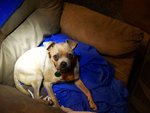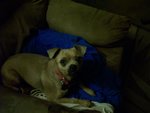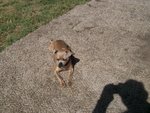at6
1st Sergeant
Introducing my new foster dog, Roo.She is a "special needs" dog because of a disc problem in her back.From what the Kings County shelter people told me, she is a Pug mix approximately 1 year old and had been at their shelter for 7 months. Based on that, I would have to say that she has pretty much spent her whole life there. At the Super Adoption event here in Fresno at Valley Animal Center, I was asked to foster her since we are better equipped to care for her and possibly get her adopted out. People looked at her Saturday and really liked her but the special needs killed the deal every time. That why she spent 7 months with them. I will foster her for as long needed.



